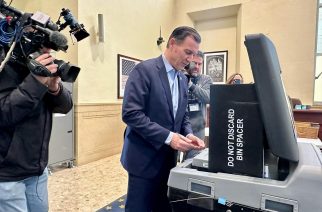
Assemblyman Richard Gottfried, right, addresses a crowd advocating for universal health care in New York state on May 24, 2016 at the Capitol. The Assembly passed the New York Health Act on Wednesday, June 1, for the second year in a row.
The Assembly voted 86-53 Wednesday to pass universal health care legislation in New York, marking the second time in two years the bill passed the Democrat-controlled house.
The issue of health care has received increased attention since the passage of the Affordable Care Act in 2010. But some state lawmakers, physicians, nurses and patients say the federal program doesn’t go far enough and legal challenges are still threatening its full implementation.
The New York Health bill (A.5062-a) passed by the Assembly Wednesday would provide universal, complete health care coverage to every New Yorker without deductibles, co-pays, or limited provider networks.
“Health insurance plans have now asked the state for a 17 percent rate increase, with some plans as high as 45 percent,” said Assembly Health Committee Chair Richard Gottfried, lead Assembly sponsor of the bill. “Year after year, the cost of coverage for families and employers goes up faster than wages and inflation. Premiums, deductibles, co-pays, out-of-network charges, and uncontrolled drug costs undermine health care and family finances, and are a heavier burden on employers and taxpayers.”
Based on a recent national poll by Gallup, 58 percent of Americans, including 41 percent of Republicans, are in favor of a single-payer system, showing there is support for this movement.
This sentiment was revealed on Tuesday, May 24, as hundreds crowded inside the Capitol in Albany to fight for universal health coverage in New York state.
The determined and energized crowd held signs and chanted slogans on the Million Dollar Staircase, calling for universal health care in New York, an effort that began in 1992, the first time this bill was introduced. Gottfried was in attendance to stress the importance of passing this piece of legislation.
Many others spoke up to endorse the bill, including those with first-hand experience of how the current system operates. Marva Wade, vice president of the New York State Nurses Association, said passing the bill would mean “full access and better care for all, with huge savings for the vast majority of New Yorkers.”
Umair Jangda, a doctor at Jamaica Hospital in Queens, recounted a story of a patient who was diagnosed with leukemia and was unable to afford treatment due to the pharmaceutical company spiking the cost of the drug. He was a recent, legal immigrant who was uninsured, meaning the cost of being treated was simply unaffordable. Dr. Jangda pointed out that this is a common occurrence and that it upsets him seeing so many patients who could potentially be treated, but are not, because of the cost.
Beyond a moral standpoint, the current system is also bad for businesses and job growth, according to Cor Drost, president and CEO of the Ithaca-based medical device manufacturer Transonic Systems, Inc. He said that due to high insurance costs, many companies are forced to move jobs to other countries, such as Canada, where employee medical insurance costs substantially less. In order to stay competitive, he argued, companies must resort to these money-saving tactics, even if it means hurting local economies.
“The Affordable Care Act has made important improvements to the system, but as long as our health coverage comes from insurance companies, it will be an increasingly unbearable burden,” Gottfried said. “One-in-three Americans still put off medical treatment due to cost in 2015, and 40 percent of New Yorkers reported having cut down on other expenses to afford health care.”
The Senate bill (S.3525) is sponsored by Bill Perkins, D-Harlem, and was amended in the Senate Health Committee on April 29. It has 22 sponsors in that house.









